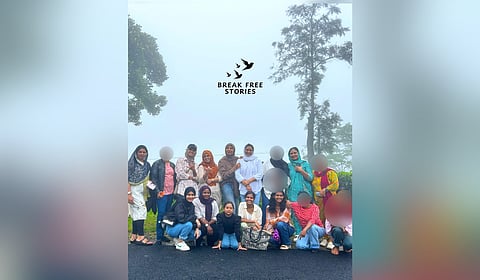

KOZHIKODE: In a room filled with tea cups, quiet tears, and bursts of unexpected laughter, a group of women, strangers just hours ago, are bound by something deeper than words. They are not here for therapy or legal advice, but for the opportunity to breathe freely, speak without shame, and to remind themselves — and one another—that life after divorce can still be beautiful.
Launched under the banner of Break Free Stories, this unique initiative is the brainchild of 30-year-old Rafiya Afi — a divorcee herself — who transformed her personal pain into a platform for hope. “I thought I was alone in my grief,” she recalls. “But when I started sharing my story on social media, I realised hundreds of women were silently suffering, too. That’s when the seed for the camp was planted.”
What started as a modest WhatsApp group for legal support and emotional sharing has now blossomed into a full-fledged movement. Now, over 100 women across the state —from Kochi to Kozhikode to Thiruvananthapuram — are in talks with Rafiya for the conduct of such gatherings.
The first camp, held recently in Vagamon, welcomed 15 women with different stories but one common thread the pain of a fractured marriage. Some had finalised their divorces; others were still enduring the slow grind of legal battles.
The event offered them something they rarely find: A non-judgmental, all-women circle focused not on what went wrong, but on what could still go right. “We’re not here to cry over the past,” Rafiya emphasises. “But to learn to smile again.”
From self-expression sessions and healing conversations to activities like team cooking, storytelling circles, and light trekking, the camp weaved together wellness and joy in subtle but powerful ways.
‘It’s not just about surviving divorce, but thriving after it’
The impact has been undeniable. “For the first time in years, I laughed without guilt,” said a woman from Kozhikode who was part of the maiden camp. “We didn’t know each other, but we bonded instantly. There was no awkwardness, no shame. Just connection.”
For many women, divorce is not just a personal loss — it’s a social exile. Stigma, financial insecurity, and lack of family support compound the emotional trauma. “One of the biggest problems,” Rafiya explains, “is that many parents still see divorce as a personal failure. That adds another layer of pressure.”
Rafiya, who was fortunate to have supportive parents herself, is now working to raise awareness among families. “Without your family behind you, recovery is so much harder,” she says. Rafiya often speaks at women’s forums and parent groups, urging them to shift their perspectives from shame to support.
What truly captured the public imagination was the camp’s official trip. Over the course of the occasion, participants shared meals, talked with each other, and even danced to songs — rekindling parts of themselves long forgotten. Due to overwhelming demand, the proposal is to hold camps at various locations with 15-20 women at a time. Plans are also in motion to incorporate adventure sports, self-defence classes, financial-literacy workshops, and career mentoring. “There’s something revolutionary about women coming together like this,” Rafiya says. “It’s not just about surviving divorce, but thriving after it.”
“I have also received calls from divorced men who are going through difficult times due to the process. If more members join, we will conduct camps for men dealing with divorce,” she adds.